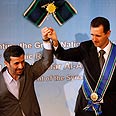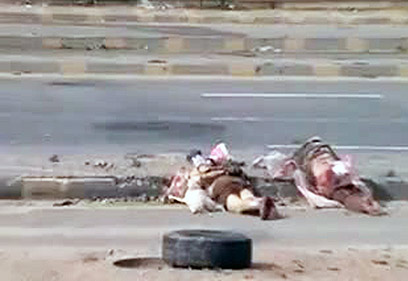
Report: Iran in direct contact with Syrian opposition
Daily Telegraph says Tehran most likely trying to 'mould opposition's wider views on Israel, West rather than offering any real support'
Iran, the closest ally of Syrian President Bashar Assad's regime, has been holding talks with members of Syria's opposition for the past month, the Daily Telegraph reported Tuesday.
On Monday Jordan's King Abdullah called on Assad to step down, and over the weekend the Arab League suspended Syria in response to the killings of anti-regime protesters.
Related articles:
According to the British newspaper, Iranian officials met moderate Syrian opposition leader Haytham Manna, as well as other members of a group known as the National Coordinating Body for Democratic Change, or the National Coordinating Committee.
The group, the report said, is strongly opposed to foreign intervention in Syria, and is likely to be seen as more acceptable to the regime in Tehran than the largest group, the Syrian National Council, which has called for "international protection" for civilians.

Dead Syrian protestors (Photo: AFP)
A Syrian opposition journalist was quoted by the Telegraph as saying that Iran "used Haytham Manna to prepare for an opposition conference." However, he said the attempt failed as "no one trusted Iran."
Syrian opposition leaders claimed early in the uprising that members of the Iranian Revolutionary Guard's Al-Quds force were working with the Syrian army to put down demonstrations.
But according to the Telegraph, even Iranian President Mahmoud Ahmadinejad has shown signs of "becoming frustrated with Mr Assad." In August he called for the Syrian government to negotiate with the opposition, and by last month he was directly demanding that Assad implement reform.
The British daily said Iran "has a lot to lose" if Assad falls, as Damascus is home to the headquarters of Iran's two main terrorist clients in the Arab world, Hamas and Hezbollah, and provides both a route for supplying them and diplomatic cover.
Manna did not reply to the Telegraph's requests for comment, but according to the newspaper the Iranians were most likely trying to "mould the wider views on Israel and relations with the West of the opposition rather than offering any real support."
- Receive Ynetnews updates directly to your desktop










